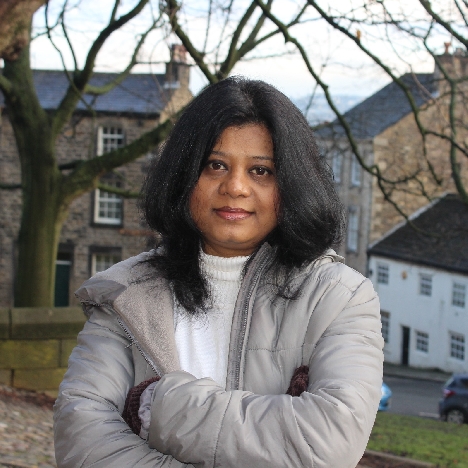A talk by Sadaf Noor E Islam, Postdoctoral Researcher, Department of Anthropology, Durham University, on the health-seeking behaviors of Rohingya refugees living in crowded camps in Bangladesh, in the context of the COVID-19 pandemic.
_______________
DATE: Thursday, September 27, 2022
TIME: 9am Berkeley | 5pm UK | Calculate your local time
REGISTER HERE
_______________
ABSTRACT
This presentation is an anthropological examination of the health-seeking behaviours of Rohingya refugees living in crowded camps in Bangladesh, in the context of the COVID-19 pandemic. One international organisation providing medical care in the Kutupalong camp has found non-cooperation among the residents regarding the health facilities on offer to them. This ethnography highlights the Rohingya refugees active mistrust (Carey 2017) of these medical services. We argue that these prevalent forms of mistrust provide a lens through which their individual life trajectories and politics can be understood in the context of the history of their systemic oppression by the Myanmar government. We reflect on the precarity and vulnerability of the Rohingya refugees, within which they identify mistrust as a source of resistance and protection. The mistrust of the Rohingya communities also highlights their attempts to communicate with a global public (Canetti 1960) and exhibits the crowd politics (Chowdhury 2019) within a continued statelessness which is engendered by the Bangladeshi and Myanmar governments. This article makes an original contribution to the discussion of trust, mistrust, and rumour in society, identifying the crowd as a site of resistance, and providing an account of the distinctive experience of the Rohingyas as refugees, and their health-seeking behaviour in the camp.
SPEAKER BIOS
Sadaf Noor E Islam is a medical anthropologist with extensive ethnographic research experience through her Wellcome Trust-funded PhD on the biomedicalisation of death in Bangladeshi hospitals. Her research interests are in the fields of health, biomedical technology, death and end-of-life care, hope and health; gender and social inequalities; and hospital and ethnographic research. She is well networked with and knowledgeable about Bangladeshi and Rohingya contexts at home and in the UK diaspora. She is currently a postdoctoral research associate on the British Academy/Leverhulme-funded research project Household Dynamics under Crisis: COVID 19 Policies and its Implications for Bangladeshis at Home and in the Diaspora (UK).
Nayanika Mookherjee is a professor of political anthropology and Co-Director of the Institute of Advanced Studies at Durham University (UK). She has expertise in anthropology of politics, violence, ethics, aesthetics, irreconciliation and transnational adoption. She is the author of The Spectral Wound. Sexual Violence, Public Memories and the Bangladesh War of 1971 (2015 Duke University Press; 2016 Zubaan) and has recently guest edited the 2022 special issue of the Journal of Royal Anthropological Institute (JRAI): On Irreconciliation. In 2019 she co-authored a survivor-led guideline, graphic novel and animation film titled Birangona and Ethical Testimonies of Sexual Violence During Conflict, in Bangla and English, which received the 2019 Praxis Award from the Association of Professional Anthropologists. It is being used for teaching research methods by academics as well as by governmental and non-governmental organisations working with survivors of sexual violence during conflict. She is the Principal Investigator of the British Academy/Leverhulme-funded research project Household Dynamics under Crisis: COVID 19 Policies and its Implications for Bangladeshis at Home and in the Diaspora (UK).
_______________
Established in 2013 with a generous gift from the Subir & Malini Chowdhury Foundation, The Subir & Malini Chowdhury Center for Bangladesh Studies at UC Berkeley champions the study of Bangladeshs cultures, peoples and history. The first of its kind in the US, the Centers mission is to create an innovative model combining research, scholarships, the promotion of art and culture, and the building of ties between institutions in Bangladesh and the University of California.
Like us on FACEBOOK
Event is FREE and OPEN to the public.

